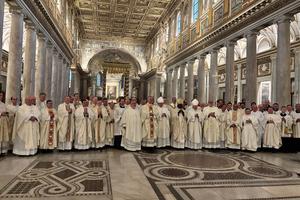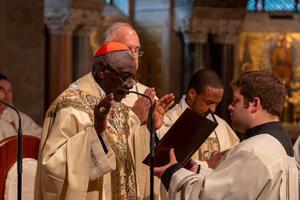Dioceses Worldwide Halt Public Masses Amid Growing Fears of Coronavirus Spread
Cardinal Robert Sarah stressed that, despite whatever restrictions that might be in place, “nobody, absolutely nobody, can prevent you from turning to God and asking for his help at this time of great trial.”

VATICAN CITY — One by one, episcopates around the world are instructing their priests to suspend public Masses as fears over the COVID-19 spread in tandem with government directives limiting social gatherings.
At least one diocese in the United States has gone so far as closing all of its churches, while an appeal has been launched in Rome to restart public celebrations of the Eucharist.
The decision has spread far and wide: After Hong Kong and Seoul canceled Masses in February, Italy’s bishops followed suit on March 8, giving a dispensation from the Sunday obligation. Italy has the second-highest number of mortalities from the virus after China, with 2,503 deaths as of March 17.
The Italian episcopate’s decision, taken on the same day as a government decree banning all civil and religious ceremonies, including funerals, is to last at least until April 3. Like most dioceses, the ruling was based partly on reports of the virus’ highly contagious nature, it’s relatively high mortality rate, and that people can be carriers without realizing it.
The Vicariate of Rome and the Vatican also soon complied, with the latter closing St. Peter’s Square on March 10, and therefore sealing off access for pilgrims and tourists to St. Peter’s Basilica. The decision was taken the morning after Italy’s government imposed a nationwide lockdown.
On March 15, the Vatican announced that all Easter liturgies at the Vatican would take place this year without the presence of the faithful and that they would instead be livestreamed via Vatican Media.
But some Roman citizens have not easily accepted the imposition of removing the Mass.
Elisabetta Valgiusti, founder of Save the Monasteries Association that makes films on safeguarding Christian heritage, said the bishops’ decision “has been the most painful experience in my life as a member of the faithful” and has issued an appeal to restart the Masses while respecting current legislation and directives connected to the emergency.
Valgiusti said she believed suspending Masses is “instilling fear,” ignoring the “spiritual needs” of laypeople, and failing to consider that alternative measures could have been found.
Although the coronavirus has yet to reach the United States to the same degree as parts of Europe or Asia, the majority of archdioceses and dioceses have now suspended Masses.
Seattle; New York; Chicago; Memphis, Tennessee; and Washington, D.C., where some of the highest number of cases in the U.S. have been recorded, were among the first to do so, while a few dioceses have continued to offer Masses but encouraged those with health conditions and especially the elderly to remain at home.
All three dioceses of Colorado suspended Masses on March 13, after the state governor ordered the cancellation of all public gatherings of 250 or more people. The bishops said they were acting “out of prudence and in charity” to help mitigate the spread of the virus and following the examples of other countries whose proactive steps led to “far better outcomes.”
Most dioceses have allowed churches to stay open for private prayer and confession, and funerals and weddings are still allowed in states such as Colorado if the group numbers are reduced.
‘Most Painful Decision’
But the decision has not been an easy one to make for some bishops.
Bishop Thomas Tobin of Providence, Rhode Island, tweeted it was “the most painful decision I’ve had to make in my 27 years as a bishop.” He added: “I cannot imagine asking our people to go without Mass and Holy Communion, especially as Easter approaches. But it has to be done.”
Some dioceses, such as Harrisburg, Pennsylvania, have gone further than halting Masses by extending a ban to all public liturgies and devotions and closing all churches and chapels, including perpetual adoration chapels.
Bishop Ronald Gainer of Harrisburg said the March 17 action was taken “out of great concern for the health of the faithful and in union with the bishops of Pennsylvania,” but the move has displeased some. One concerned Pennsylvanian suggested that the diocese acted out of fear of litigation rather than the welfare of the faithful.
Asked why churches were closed, a spokeswoman for the diocese told the Register that the decision was taken “on the recommendation of health-care professionals.” She added that it was a “temporary closure” to allow public spaces to be thoroughly cleaned and disinfected but was unable to say when the churches would be re-opened.
Other dioceses across Pennsylvania, including Philadelphia, have also halted Masses. Bishop David Zubik of Pittsburgh said arrangements would be made instead “to livestream more Masses in the days ahead” and that parishes would be offering “regularly scheduled times for the sacrament of reconciliation.” Health guidelines regarding “social distancing will be followed,” he added.
Situation in Other Countries
In Europe, Belgian bishops canceled all public Masses on March 12 until at least April 3, while weekend Masses in the Netherlands were provisionally suspended until March 31. Masses are mostly or in the process of being suspended in France, Switzerland and Germany. Large German dioceses such as Cologne canceled public celebrations of the Eucharist early on, and the Regensburg Diocese suspended Masses from March 18.
The faithful seem accepting of the decision, realizing that most churchgoers are the elderly and so most at risk.
“I understand it’s for health reasons; it’s dangerous for them,” one German parishioner told the Register. “But there is a kind of strange, Doomsday feel about this — especially not going to church on a Sunday.” For the time being, smaller German dioceses with fewer parishioners continue to have public Masses, at least on Sundays.
In Ireland, several bishops canceled Masses in their dioceses while leaving churches open and restricting weddings and funerals to numbers of 100 people or less.
Beyond Europe, on Monday, Ghana’s bishops’ conference instructed bishops and priests to only allow private Masses with not more than five people in attendance, while suspending funerals and weddings for a month. The bishops said the decision was taken after President Nana Akufo-Addo suspended all public gatherings, including conferences, funerals and church activities for four weeks.
A spokesman for the Archdiocese of Seoul, one of the first archdioceses to suspend all public Masses, said it took the decision “in compliance” with its government’s “social-distancing policy” to help limit the spread of the coronavirus. South Korea had one of the highest numbers of coronavirus cases, but the number has been steadily decreasing.
In the Iraqi capital of Baghdad, where the government imposed a curfew March 17-24 to stem the spread of COVID-19, which has taken at least 10 lives and infected 124, the Chaldean Catholic Church canceled Sunday Masses, according to AsiaNews.
In Southeast Asia, the Archdiocese of Manila suspended Masses from March 14 for at least a week after Philippine President Rodrigo Duterte placed the country’s capital on lockdown to fight the virus. Singaporean bishops have also followed suit.
Scheduling Extra Masses
But some bishops have made the Mass more available. The president of the conference of Poland’s Catholic bishops, Archbishop Stanisław Gądecki, asked that extra Masses be made available to make the congregations smaller.
In a statement, Archbishop Gądecki declared it would be “inconceivable” for Polish Catholics not to pray in their churches. Just as “hospitals treat diseases of the body,” so the Church treats “diseases of the spirit,” he said.
In Australia, the Archdiocese of Sydney issued a statement, saying it had already implemented “preventative measures and liturgical accommodations” to address the risk and so would not be canceling public Masses, although, after March 16, large gatherings of more than 500 people would be banned.
The bishops of England and Wales had resisted suspending public celebrations of the Eucharist, but on March 18 announced that, “following official advice and in order to keep each other safe, save lives and support the NHS, at this time we must not gather for public acts of worship in our churches.” Masses will cease from Friday evening.
A Rome-based priest urged the faithful who have had their Masses suspended to “put their trust first in supernatural means,” offer spiritual communion and, together with the works of penance, “placate divine justice and beg heaven’s favor through the intercession” of the Blessed Virgin Mary and the help of St. Michael the Archangel and St. Sebastian.
“The penance of Lent is less and less mentioned or advised and so almost imperceptible today,” he said. “But now it’s being effectively imposed and should be fully embraced, acknowledging the sins of men and nations at Christ’s feet.”
He advises priests to celebrate private Masses with more reverence and an attitude of penance, making processions with necessary precautions. “It’s time to ask for forgiveness for private and public sins of nations,” he said, and pointed out that, in Italian, some are already referring to quarantine (from the Italian quarantine, meaning 40 days) as forced quaresima — quaresima being the Italian word for Lent (40 days).
Cardinal Sarah
In an open letter to friends on Tuesday, Cardinal Robert Sarah, prefect of the Congregation for Divine Worship and the Discipline of the Sacraments, stressed that no matter what measures prevent a person from taking part in the Eucharist, “nobody, absolutely nobody, can prevent you from turning to God and asking for his help at this time of great trial.”
The faithful, he said, must “pray more” at this time, especially with a “heart of love and charity, a heart reconciled with our brothers and sisters.”
As the coronavirus “oppresses the peoples of the whole world,” he said, “we must turn with more intensity, confidence and truth towards God, entrusting ourselves to his Fatherly tenderness and to the Blessed Virgin Mary, so that she covers us and protects us with her maternal mantel.”
United in the same faith, he concluded, “let us raise our hands to God and implore him. Let us entrust the world and its Church to him. His Heart will soften and save us.”
Edward Pentin is the Register’s Rome correspondent.
- Keywords:
- cardinal robert sarah
- coronavirus
- edward pentin

















